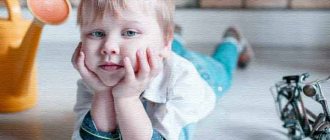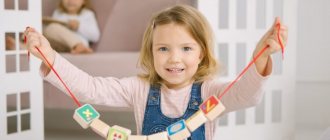Speech is a form of communication between people using linguistic structures. When a child is born, he does not know how to do anything and the task of an adult is to teach him everything. Teach to walk, hold a spoon, a mug, go to the potty and talk. While everything else is more or less clear, parents always have a lot of questions regarding speech. What to do if the child does not speak? If he speaks “his” language? And many, many different questions. Today we’ll talk about speech development, speech delays, examinations and more.
My child does not speak, is silent, speaks little, speaks poorly!
At a Sarclinic consultation, parents ask: “ Why doesn’t a 3-year-old child speak, doesn’t speak , what should I do?” “ A 4-year-old child speaks poorly and is silent !” “Why doesn’t a boy speak for 5 years, where should I go?” “A 6-year-old girl does not speak, speaks poorly, how to treat?” “ Why does a child speak poorly or say few words? “ How to teach a child to speak and talk?” “What to do if a preschooler, schoolchild, boy, girl does not speak in sentences, as if he has porridge in his mouth?” “How to help a child if speech development suffers, there is no active speech, speech centers suffer, and there is no vocabulary?” “Children younger than us form sentences, and we moo, where should we turn if just mooing is all?” “When will the baby start talking?” Let's look at the main reasons why babies don't speak.
Reasons why a child does not speak
The main reason why a boy or girl, son or daughter, son or daughter, son or daughter (daughter), a child does not speak is intrauterine hypoxia, or lack of oxygen. Lack of fetal oxygen can occur during pregnancy, during childbirth, and during caesarean section. In this case, an experienced microneurologist , pediatric neurologist , pediatric neurologist makes a diagnosis of “perinatal encephalopathy of post-hypoxic-ischemic origin” or “perinatal encephalopathy of mixed origin” (perinatal damage to the central nervous system). Perinatal encephalopathy can be grade 1, 2, 3.
Stage 1 perinatal encephalopathy with timely and comprehensive treatment at Sarklinik is completely cured in a fairly short time. Stage 2 perinatal encephalopathy is a serious disease that requires long-term serious treatment. Stage 3 perinatal encephalopathy usually has serious consequences, including the development of pathology such as cerebral palsy. Frequent causes of delayed speech development in children are pathology of the mother during pregnancy, birth trauma of the child, difficult childbirth, poor results of neurosonography, entanglement of the umbilical cord, breech presentation of the fetus, weakness of labor, anatomically or clinically narrow pelvis, somatic diseases of the mother before and during pregnancy, maternal infections, fetal infections, toxic effects on the child's brain of bilirubin in hemolytic jaundice of the newborn (HDN), intoxication with anesthesia during cesarean section, intoxication with drugs (drugs) in the perinatal period. Any somatic pathology, ARVI, bronchitis, tracheobronchitis, infections, rickets, metabolic disorders lead to the fact that at a later age the child does not speak , the child speaks poorly , the child speaks little , the child is silent , begins to speak late, speaks little, is not clear , incomprehensible, retarded in development, retarded in speech, mental, psychomotor, psycho-speech development, mental development.
There is RRD (retardation, delayed speech development, including severe delay in speech development), ZPR (lag, delayed mental development), ZPRR (delayed psycho-speech development in children), PMR (delayed psychomotor development in a child), ZUR (mental retardation). development in children). Rarely, a child is influenced by hereditary factors in which developmental delay was observed in the mother or father, or in both. Any weakening of the child’s body, decreased immunity, side effects of vaccinations (vaccines) can lead to the fact that “ the child does not speak .” Also, a child’s speech development is negatively affected by an unfavorable environmental situation in the area where the mother and child live, an unfavorable climate in the family (conflicts between parents), defective, unclear speech in a contact environment (speech problems among relatives or parents), the birth of a second child in the family, the presence of severe severe neurological diseases (for example, cerebral palsy). With delayed motor development, there is often a delay in speech development, and later a delay in mental development. With any damage to the organ of hearing, a condition in which “ the child does not speak ” is also noted. In this case, you need to consult an otolaryngologist (ear-nose-throat-doctor).
Why does “earlier” mean “better”?
The child's body is unique in its ability to compensate. Absolutely all doctors say that the earlier a disease or developmental pathology is detected, the easier it is to eliminate it.
In particular, teaching a small child to speak is much easier. At this age, the most active processes of speech formation take place. Right now it will be much easier for him to catch up with his actively chatting peers. 13 ways to teach a child to speak at 2-3 years old.
In addition, long-term speech delay leads to other troubles - mental retardation. Correct speech and the ability to communicate give the child the opportunity to develop. Lack of communication inhibits the formation of cognitive processes and the emotional-volitional sphere. Ultimately, the child will fall far behind his peers. The preschool period is characterized by the most active development of all areas. This means that by the time school arrives, the gap will be very serious.
What to do if the child does not speak?
Many parents turn to a speech therapist with this question. But a speech therapist can make sounds, the letters “r”, “l”, “sh”, “shch”, hissing, if the child can respond to classes. A speech therapist is a teacher, not a doctor. With hypoxic lesions of the brain and central nervous system, the speech therapist is powerless. In these cases, complete comprehensive speech rehabilitation of the child is needed. Unfortunately, some careless parents, mothers and fathers wait for the child to speak on his own and naively think that he is being lazy. But we must not forget about the norms of speech development. At 1 year old, a child should speak 10 words, at 2 years old – 50 words, build phrases and sentences from 3 – 4 words. By the age of 2.5 years, a child normally speaks from 100 to 200 words and constructs sentences of 5 to 7 words. At 3 years old, a child absorbs the words of adults like a sponge, should already speak in complex sentences of 6-8 words, and at 4 years old, the vocabulary should already be about 2000 words.
Passive and active vocabulary
During this period, attention is drawn to such a characteristic feature as imitation of the words of adults. The baby repeats not only familiar words, but also previously unknown ones. These could be words addressed to the child, or words that he heard from others. Such active imitation can be noticed already from 1 year 5 months. Here it is important not to coo with children, faking your speech in “childish” language, but to give an example of the correct pronunciation of words.
Starting from the first year of life, the understanding of words grows; the baby is familiar with the names of objects in his immediate environment, the names of objects, animals and other objects that are most often shown to him in pictures in children's books, on the street. The baby loves to look at bright colored book illustrations. Adults should maintain this interest by choosing clear pictures.
When commenting on illustrations to a child, you need to speak precisely, in simple words, try to denote the object with one, constant word, so that the meaning of the picture is not lost in the stream of speech of an adult. For example, while the word monkey is used to describe monkeys and gorilla.
By the age of one and a half years, a child’s active vocabulary is 20–30 words; its sound composition is still simple. Thanks to the desire to imitate the speech of adults, by the end of the second year the baby increases the number of spoken words tenfold. Speech is dominated by nouns, but there are also verbs (2-3 times less of them) and adverbs (there, here, here).
Occasionally, by the age of two, the use of adjectives can be found in children's speech; this feature will continue to persist into early preschool age. Personal pronouns are often found in a child’s speech and are easily used (I, you, he, she).
The earlier treatment for speech disorders is started, the higher its effectiveness.
When speech development is delayed, an important point is the time of initiation of treatment. If a child does not speak 10 words per year, then there is no need to wait until he is 7 years old when he “starts speaking on his own.” After all, precious time is wasted. The later treatment is started, the more difficult it will be to catch up with healthy children of the same age, since with increasing age the lag will become noticeably larger and larger. Some children, when their parents address them, understand the speech addressed to them, but do not respond, there are only gestures. Some children do not understand the spoken language and do not speak. Which is very bad. And if children speak little, indistinctly, then speech correction is needed.
Treatment of children with delayed speech development, how to treat children with speech disorders
Fortunately, Sarklinik has treated hundreds of children with delays in speech, psycho-speech, mental, motor, and psychomotor development. Treatment of alalia, treatment of dyslalia, treatment of general speech underdevelopment, treatment of dysgraphia, treatment of acalculia, treatment of encopresis, treatment of perinatal encephalopathy, treatment of tone disorders, treatment of akataphasia, treatment of akatagraphy, treatment of intracranial hypertension syndrome, treatment of dyslexia, treatment of autism, treatment of cerebral palsy, treatment are provided. enuresis, treatment of minimal cerebral dysfunction in Russia, in the Saratov region, in Saratov. Sarklinik knows how to teach a child to speak, how to treat and cure a child, how to treat delayed speech development in a child , how to treat delayed psycho-speech development in children, how to cure delayed neuropsychological development, how to give impetus to speech development, how to replenish vocabulary, how improve speech. Treatment methods have proven themselves over the years. Severe, moderate, and mild delays in psycho-speech development, and mental retardation are treated. Sarclinic works with serious diagnoses, when parents have less and less hope for recovery. Unfortunately, in such cases, as a rule, multiple courses of complex treatment are required, as a result of which memory, thinking, speech, mental development, motor sphere, and motor activity are improved. There is extensive experience in treating children with pediatric pathologies aged from 3 months to 17 years. There are plans to publish a video course “ How to teach a child to speak ?” On the medical website sarclinic.ru you can ask a doctor a question online for free and read patient reviews. Help your child right now!
There are contraindications.
Specialist consultation is required. Sign up for a consultation .
Text: ® SARCLINIC | Sarclinic.com \ Sarlinic.ru Photo: (©) Hyrman | Dreamstime.com \ Dreamstock.ru The child depicted in the photo is a model, does not suffer from the diseases described and/or all similarities are excluded.
Related posts:
Puberty boys, girls, teenagers, adolescence, puberty
Calomasania in children: causes, treatment in Saratov, how to treat calomasania in Russia
Which doctor treats enuresis in children? Who to contact if you have enuresis in Russia?
Neurosonography of the brain of newborns: norms, interpretation, center, where to do it
Enuresis code according to ICD 11, nocturnal or daytime enuresis
Comments ()
Correction of speech regression
If the baby has stopped babbling or speaking, then you need to immediately figure out the cause of the illness. First of all, you should visit an appropriate specialist. If the baby suddenly stops talking due to stress, then an examination by a psychologist will be required. If there are no apparent reasons, you should visit a neurologist. A child who has stopped speaking due to aphasia first needs treatment for the underlying disease.
The child may be prescribed:
- medications;
- surgery;
- mechanotherapy and physiotherapy;
- speech therapy massage and exercise therapy.
For children who do not speak, speech therapy sessions are also prescribed. Teachers help the child restore speech. Writing and reading skills are developed (if necessary). If the child has stopped speaking, then correctional classes with a neuropsychologist and/or speech therapist should begin as early as possible. This can be done at the NEAPL Center for Speech Therapy and Psychology. Experienced specialists will identify the cause of speech regression and, if necessary, refer you to specialized doctors or select an effective corrective program.









